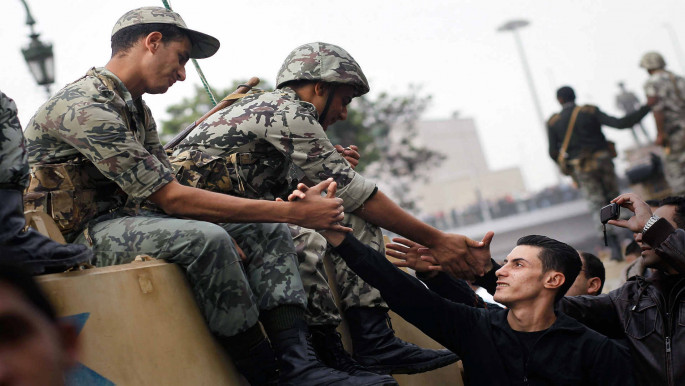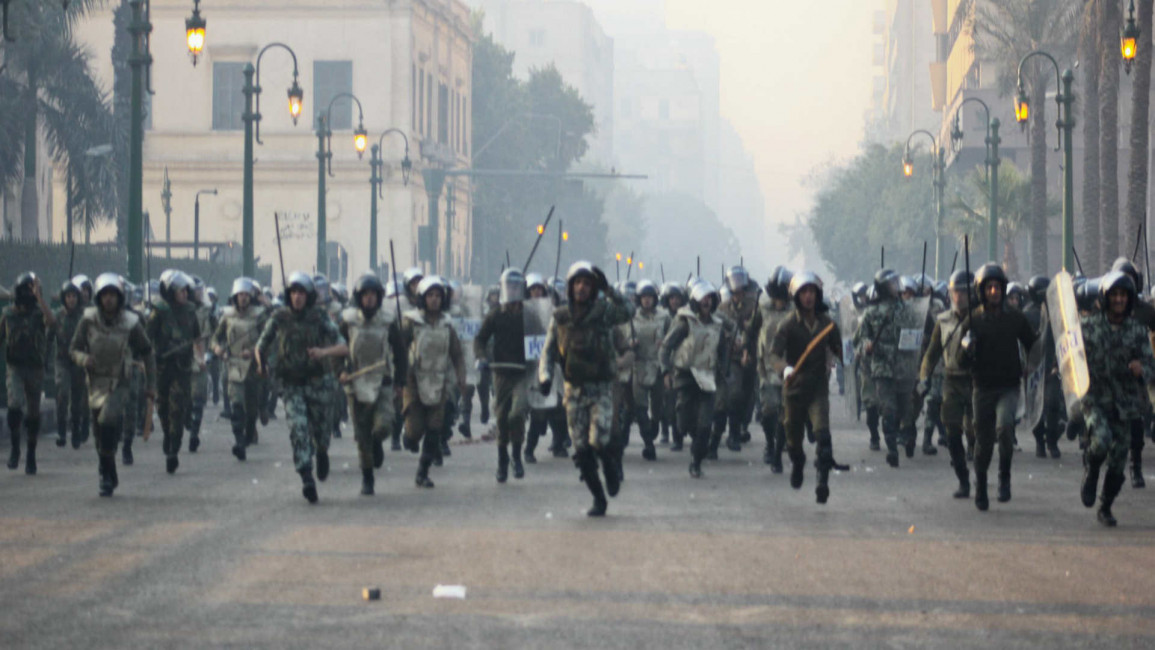
Egypt comes one step closer to total military control
"Our new training stresses the role of the Armed Forces in defending and maintaining Egypt's national security," one course attendee told The New Arab on condition of anonymity.
This move comes as one of many attempts to engrain the military into all aspects of the Egyptian state. The army's grip over everyday life has been increasing at an alarming rate since a popular uprising challenged its power in 2011.
In April alone, the Ministry of Education announced plans to convert vocational high schools to military academies, and a bill was introduced to parliament proposing granting control over al-Azhar to the country's President Sisi. Yesterday, another MP announced that he will introduce a bill to extend the president's term in office from four years to six.
These plans not only give the army great influence over vital institutions and public opinion in turn, they also allow the military to become so deeply rooted in the state that any attempts to challenge their hold on power will face almost certain failure.
In an attempt at resurrecting the good old days of officer rule, President Sisi seeks to solidify the role of the military in all aspects of Egyptian life. The state institution has been transformed from its traditional role as a tool of executing foreign policy to an all-encompassing force, the exclusive keeper of patriotism, infallible in the face of criticism, worshipped at the secular altar of the nation. After 2013, denouncing the army became equivalent to hating Egypt.
 |
After 2013, denouncing the army became equivalent to hating Egypt |  |
"The most important part of the new training provides techniques of combating 'fourth generation warfare'," the anonymous attendee said. "President Sisi mentions this idea frequently in his speeches, he identifies it as a part of a global conspiracy against Egypt which uses new and social media to cause unrest."
Ending Mubarak
 |
|
|
Army officers joing anti-Mubarak protesters in |
January 25 presented the army with a complication and an opportunity. Mubarak was a military man but since the 1990s his government introduced privatisation policies that served Egypt's oligarchs.
Abandoning his military roots and swaying towards the business class was not Mubarak's only blunder. The process of grooming Gamal Mubarak to inherit the presidency created an unprecedented rift between the military and the presidency. Ordinary Egyptians speaking up against power was dangerous, but it also gave the military the outlet it needed to restore its control over both the presidency and the people.
The jubilation of ordinary Egyptians in Tahrir Square at what they perceived as their army siding with them and protecting them against Mubarak was a fantasy at best. Army officers may not have killed protestors during Egypt's 18-day uprising but they also did not protect Tahrir Square from the fury of pro-Mubarak forces.
When Mubarak stepped down, a member of the Supreme Council of the Armed Forces (SCAF) made the announcement that it would take the reins. The chants on the streets revered the military, announcing that "the army and the people are one hand".
Still, the early months of 2011 taught Egyptians that they do indeed have the power to bring about political change.
The army also realised that their hold on power was not as solid as they had once presumed. The realities of the new media age caused a significant shift in power - one senior army officers had not anticipated.
Renewing the military state
![Military officers clash with protesters [credit: Mostafa Sheshtawy]](https://www.newarab.com/sites/default/files/styles/medium_16_9/public/media/images/3910EEB7-8526-45A8-A9B8-F09AFBCE7BF5.jpg?h=d1cb525d&itok=WDkoEOZN) |
|
|
Military officers clash with protesters |
Between 2011 and 2012, SCAF re-enforced its dominance through the use of force in an attempt to prevent another uprising. Closed military trials for civilians became the norm with more than 15,000 activists and journalists facing trial for exercising freedoms they thought they'd achieved by ousting Mubarak.
There were numerous clashes between the army and protesters who had forced their hand in ousting Mubarak. For the first time in decades, ordinary Egyptians woke up to the reality that the military was at the heart of their oppression.
"Down with military rule" became a common chant - inspiring much more than annoyance to senior officers like Sisi. This chant represented the reality that the Egyptian people no longer saw the army as the heroes they once were.
Never again
The election of Mohammed Morsi in 2012 did not mean the end of military entanglement in the state. Egyptians watched in wonderment as Morsi dismissed the head of SCAF, Mohammed Tantawi. To Morsi's supporters it was a display of civilian rule over the military but to his opponents it sparked fear that Islamist forces were replacing the army, taking full control of the state.
 |
|
| Morsi replaced Tantawi with Sisi as head of armed forces [Getty] |
Tantawi's replacement was Abdelfattah el-Sisi, a relatively obscure figure to the average Egyptian in 2012. Sisi was a member of SCAF, a new face to the same institution.
The changing of the generals was effectively symbolic but it gave the Muslim Brotherhood a false sense of power and security. This meant that the largest organised civil political force in Egypt lowered its defences, neutralising their opposition to military interference in the state.
Top officers continued to hold key positions in both local and central government, the head of state may have belonged to the Muslim Brotherhood but state institutions remained under military rule.
When Sisi ousted Morsi in July 2013, the army re-emerged as the only force that could save Egypt from wayward leadership. Protestors once again chanted "the army and the people are one hand".
With Sisi as president, the militarisation of the civil sectors has become an inevitability. Creeping military rule has built up over decades and under Sisi it is reaching completion.
Gehad Quisay is a history and politics researcher, who graduated from SOAS and Georgetown University. She has also worked as a researcher at a London based think-tank focusing on post-Arab Spring nation building.
Opinions expressed in this article remain those of the author, and do not necessarily represent those of The New Arab, its editorial board or staff.




